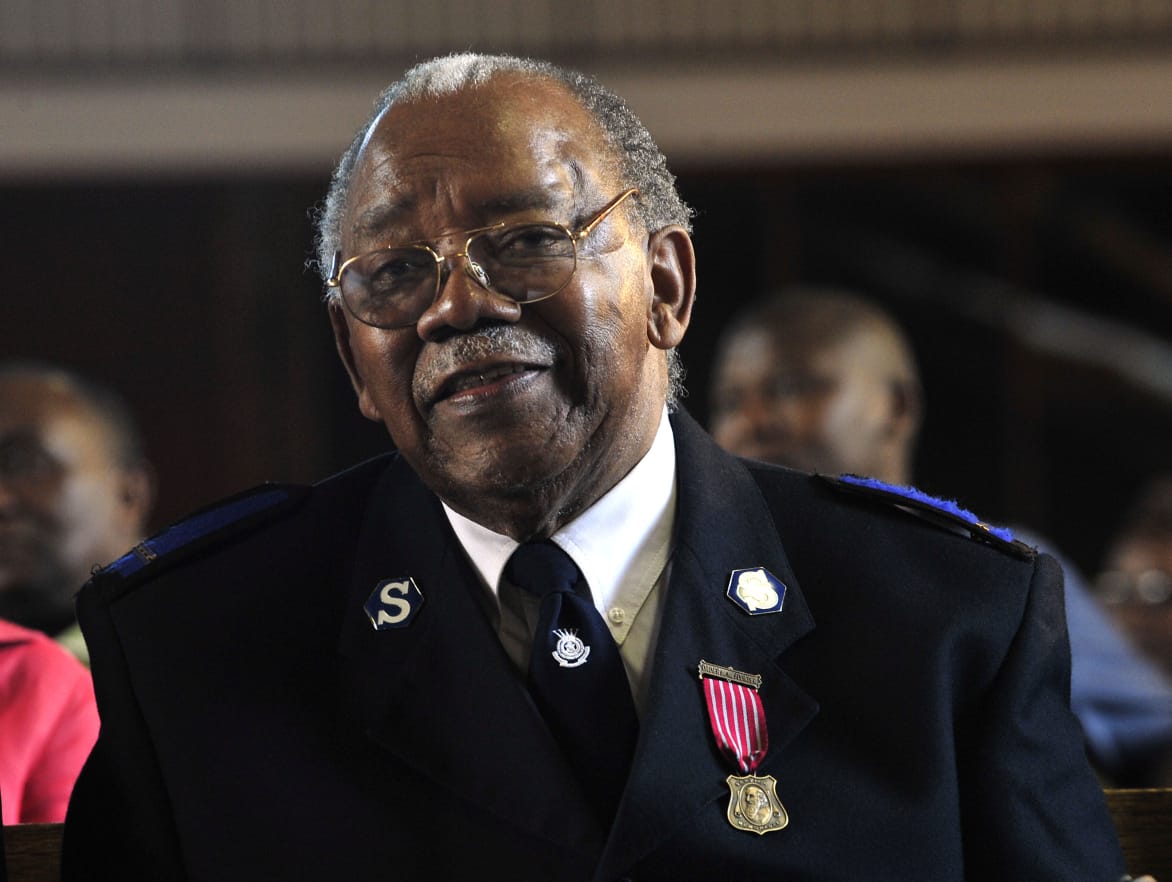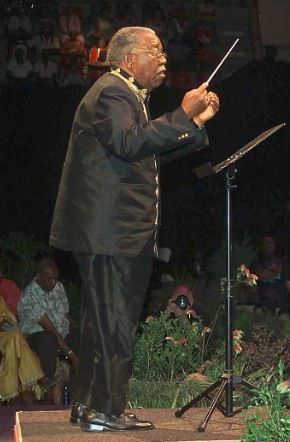
The late Professor Mzilikazi Khumalo helped create the new South African National Anthem, Nkosi Sikelel' iAfrika. Bongiwe Mchunu/ANAProfessor James Steven Mzilikazi Khumalo (1932-1921), who has died at at the age of 89, had a distinguished career as a linguist, which complemented a stellar career in music.
He was the leading composer and director of choral music to emerge from South Africa. His opera, Princess Magogo, was the first by a black South African. Today he is among the most widely performed of all South African composers.
He achieved international recognition for performances of his major works in Europe and the US. This is especially remarkable considering he had no formal qualifications in music, and composed entirely in tonic sol-fa rather than staff notation..
Khumalo worked to publish and popularise dual notation, which combined the do-re-mi of tonic solfa with the score based notations used by art music composers. This transformed the choral sphere. For decades composers and choirs had relied almost entirely on tonic solfa.
His innovations in notation also opened up new vistas for choral works in African idioms and languages. This enabled choral musicians to work seamlessly with orchestras and opera companies. His expertise in African tone systems lent considerable authority to his innovations in notation.
Khumalo collaborated with important conductors, composers, librettists and opera companies to stage genre-defining works. These included the epic “uShaka kaSenzangakhona”(1981/1996), the opera “Princess Magogo” (2002), and the song cycle “Haya Mntwan’ Omkhulu” (1999).
These works were performed to acclaim – including at the Ravinia Festival, Kennedy Centre, and many other venues across the globe.
Entry into academia
Khumalo spent most of his career teaching, first in schools, and then at the University of the Witwatersrand.
In the 1980s – with apartheid still at its height and South Africa in a state of emergency – he became the first black professor of African languages at the university. He was also its first black head of the department of African languages.
These achievements are extraordinary considering the obstacles he faced. In the 1950s, he was unable to study at South Africa’s major universities owing to the racial segregation under apartheid.
Khumalo studied first for a teacher’s diploma through the Bantu Normal College in Pretoria in 1954, before taking his Bachelor of Arts degree through the University of South Africa (UNISA) in 1956. He later achieved the Bachelor of Arts Honours by correspondence, also through UNISA, in 1972.
Khumalo’s appointment at the University of the Witwatersrand was initially as a language tutor. At the time most black scholars were not recognised as lecturers at the country’s white universities. Instead, they were handed tutoring or assistant roles. He persisted with his studies in African languages and linguistics, achieving a landmark and highly sophisticated theoretical treatise on Zulu tonology – the study of linguistic tone and pitch – for his Masters degree.
His doctoral studies were in phonology, a sub-field of linguistics devoted to the systematic analysis of speech sounds. This work included an important collaboration with Charles Kisseberth, Professor of Linguistics at the University of Illinois, US.
Languages and music
Khumalo received the Via Afrika Prize for Linguistic Studies for his article Leftward Ho! In Zulu Tonology published in the South African Journal of African Languages (1990). His outspoken criticism of the colonial nature of linguistic studies in South Africa, and abroad, is captured in published papers that speak to the rising decolonial movement in academia.
Indigenous language speakers in South Africa were underrepresented in the study of African languages before Khumalo’s time. It was through his efforts as teacher and mentor that the discipline began to transform.
Khumalo’s contributions to choral music are exemplified in his work with school, church, and community choirs, and especially through the Salvation Army. He toured the US, Europe and the Caribbean. He also established important cultural ties with the African diaspora during apartheid.
He was also pivotal in establishing the Sowetan Nation Building Massed Choir Festival which he co-directed with Maestro Richard Cock from its inception. This annual event was organised by the Sowetan newspaper, in collaboration with Transnet, the transport utility. It was televised by the South African Broadcasting Corporation. It attracted thousands of participants and audiences each year.
It became one of the premiere events for young singers and soloists, many of whom went on to achieve success both locally and abroad.
It was in this context that Khumalo and Cock first pioneered the innovative system of dual notation (tonic solfa with staff notation) that has become a staple in South Africa.

Professor Mzilikazi Khumalo conducts at a Massed Choir Festival in Johannesburg, 2017.
Peter Mogaki/Sowetan
Khumalo furthered this project at the Southern African Music Rights Organisation) where he served as vice-chairperson following his retirement from the university in 1997. In his role as a trustee of the organisation’s foundation, he promoted African art and choral music through commissions. This meant that deserving young and established composers were granted the opportunities and financial resources to dedicate themselves to the creation of new works.
He also pioneered the publication of three volumes of South Africa Sings, profiling the works of South Africa’s black choral composers in popular publications.
Accolades
Khumalo’s contributions to choral music were recognised by former arts and culture minister Ben Ngubane, who appointed him chair of the national anthem committee for South Africa in 1995. Khumalo was instrumental in advocating for Nkosi Sikelel’ iAfrika as the basis for a new anthem for the country. It was his idea to join the new and old anthems for purposes of reconciliation.
In 1999, he was awarded the Order of the Star by President Nelson Mandela in recognition of his contributions to the nation.
Khumalo’s achievements in and out of academia – as musician, public intellectual, linguist, and administrator – were recognised with honorary degrees from five South Africa universities. He also received a Lifetime Achievement Literary Award from MNET in 2007. He was Professor Emeritus of African Languages at Wits University at the time of death.
The fact that he achieved all of this against the odds is testament to his brilliantly original mind, and to the qualities of discipline, determination, and leadership that define his legacy.

Thomas Pooley receives funding from the University of Michigan for his work on Professor Mzilikazi Khumalo's intellectual legacy.
-------------------------------
By: Thomas Pooley, Associate Professor and Chair of Department: Art and Music, University of South Africa
Title: Mzilikazi Khumalo: iconic composer who defied apartheid odds to leave a rich legacy
Sourced From: theconversation.com/mzilikazi-khumalo-iconic-composer-who-defied-apartheid-odds-to-leave-a-rich-legacy-163283
Published Date: Wed, 23 Jun 2021 14:57:12 +0000
Read More
 UK PoliticsWorld PoliticsVideosPrivacy PolicyTerms And Conditions
UK PoliticsWorld PoliticsVideosPrivacy PolicyTerms And Conditions
